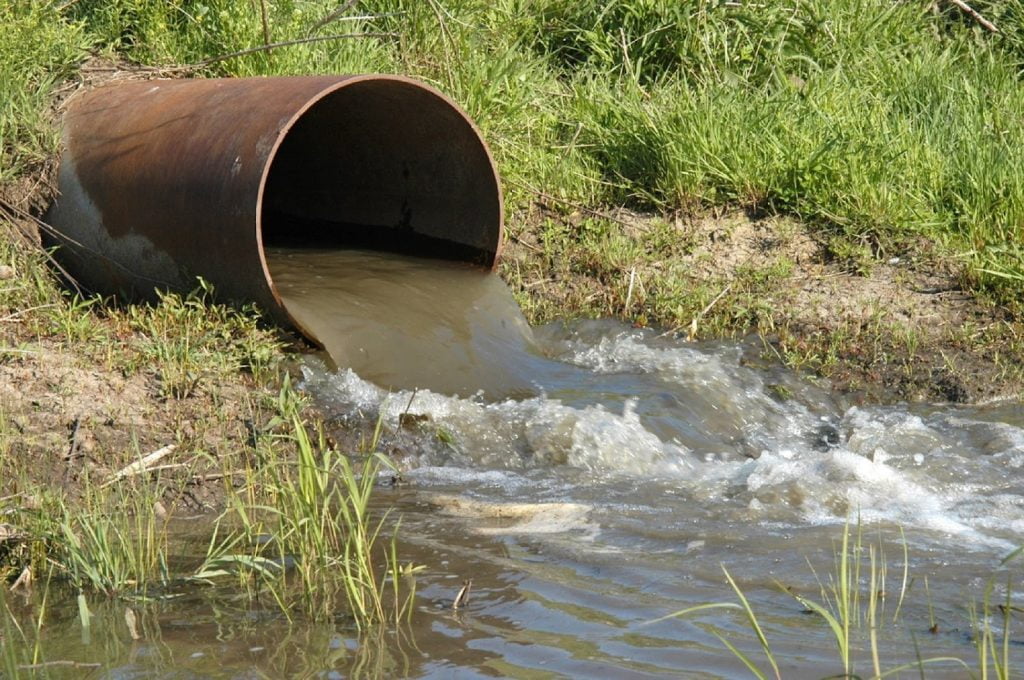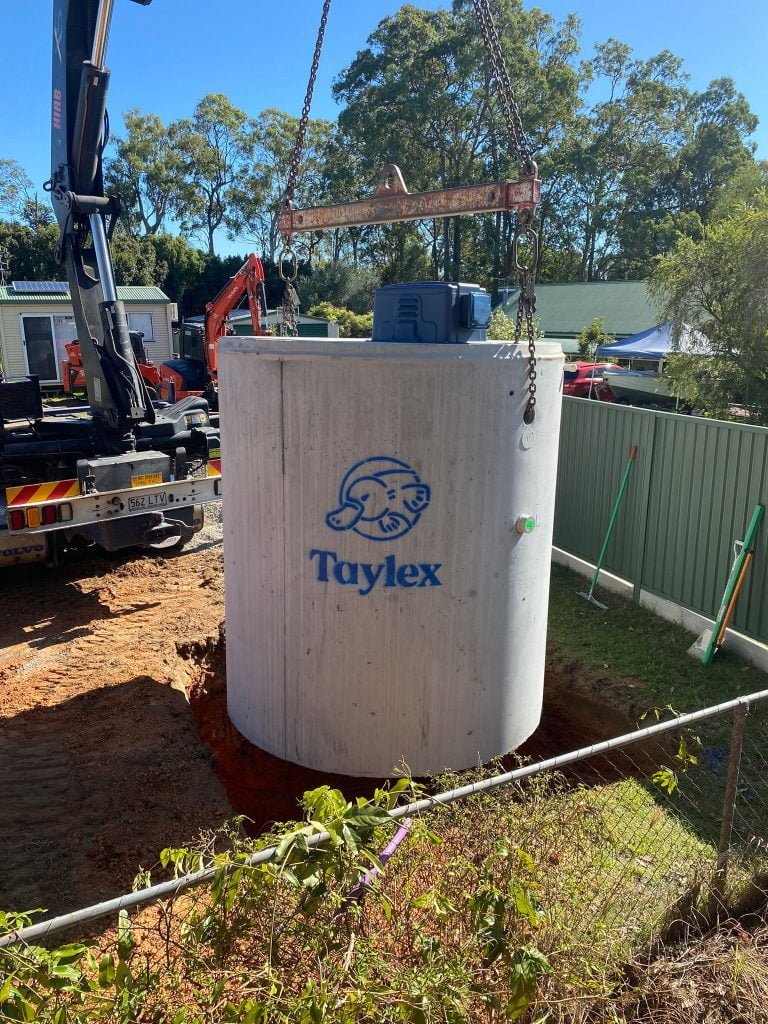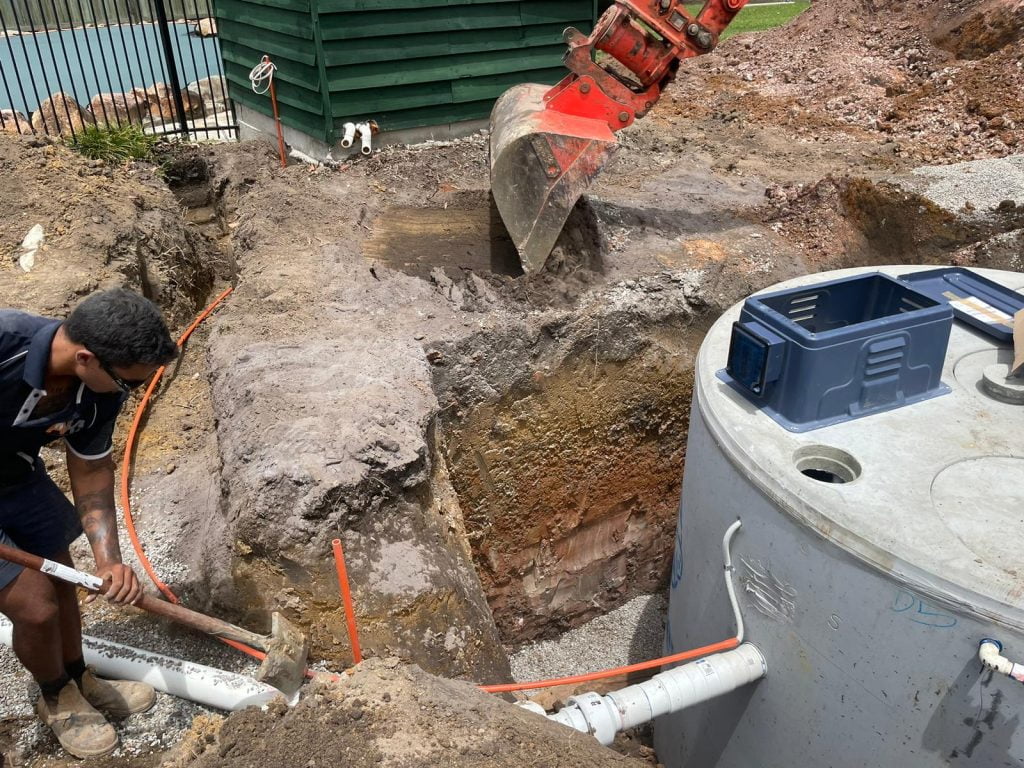Understanding Blackwater and Greywater: Key Differences and Management
Understanding the different types of wastewater is crucial for proper treatment and disposal in the wastewater management industry. Two main categories of wastewater are blackwater and greywater. Blackwater is the most contaminated type of wastewater, containing fecal matter, toilet urine, and other harmful pathogens and organic matter. On the other hand, greywater is less contaminated and comes from sources such as showers, sinks, and washing machines.
Knowing the distinctions between blackwater and greywater is essential for designing effective treatment systems, ensuring public health, and exploring potential reuse options. We’ll dive deeper into the characteristics of blackwater and greywater, their management, and the importance of proper handling to protect both human health and the environment.
What is Blackwater?
Blackwater is a type of wastewater that comes from toilets and contains fecal matter, urine, and toilet paper. It is the most contaminated form of wastewater due to its high levels of pathogens, organic material, and other harmful substances. The composition of blackwater can vary but typically includes high concentrations of nitrogen, phosphorus, and dissolved organic matter, which can significantly impact water quality if not properly treated.
Blackwater sources may include toilets, bidets, and food waste disposers. The presence of fecal bacteria and viruses in blackwater poses serious health risks, such as the spread of waterborne diseases like cholera, typhoid, and hepatitis A. Blackwater is also known to contain traces of pharmaceuticals, hormones, and other chemicals that can disrupt aquatic ecosystems and impact overall water quality.
The high concentration of organic matter in blackwater can lead to the depletion of dissolved oxygen in the water, creating anaerobic conditions that promote the growth of harmful bacteria and produce foul odours.
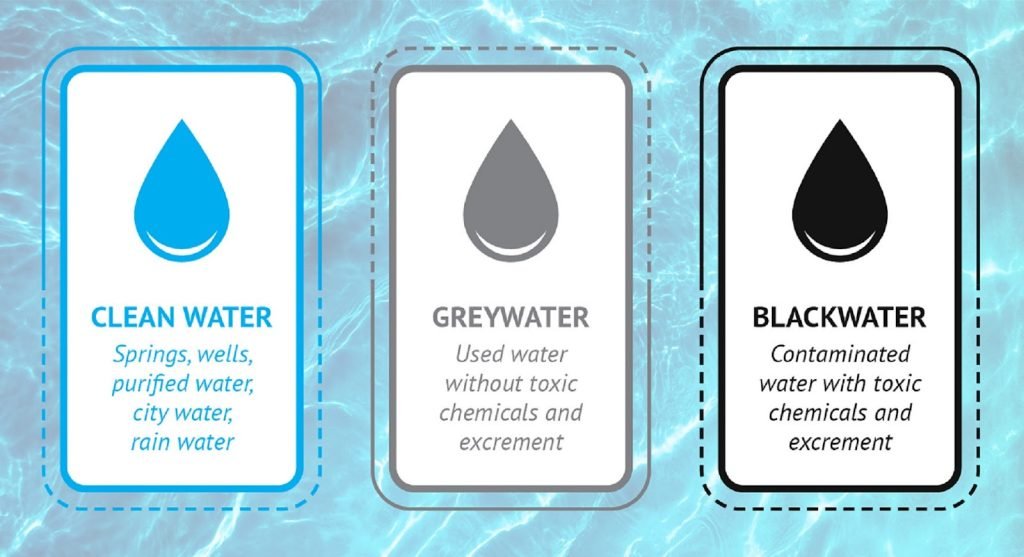

What is Greywater?
Greywater, also known as grey wastewater, comes from sources such as showers, bathtubs, sinks, washing machines, and dishwashers. It is called greywater because it appears cloudy or grey due to soap, detergents, and other dissolved substances.
Greywater comes from washing dishes, doing laundry, and bathing but does not include water from toilets or heavily contaminated sources. The composition of greywater varies depending on its source but generally contains lower levels of pathogens and organic matter than blackwater. Greywater may contain traces of dirt, hair, grease, food particles, plant matter, and chemicals from personal care products and cleaning agents.
Although greywater is less contaminated than blackwater, it still requires treatment before reuse or disposal to prevent potential health risks and environmental damage. With proper treatment, greywater can be used for various purposes, such as irrigation, toilet flushing, and outdoor cleaning. Reusing greywater can help reduce freshwater consumption and alleviate stress on water resources.
Regulations governing blackwater and greywater management
Regulations and guidelines for managing blackwater and greywater vary by state. Generally, blackwater management is subject to stricter rules due to its higher health and environmental risks. Proper containment, treatment, and disposal of blackwater are often mandated by law to protect public health and water resources.
Greywater regulations, while less stringent, still require adherence to specific guidelines for treatment and reuse to prevent contamination and ensure safety. It is crucial to follow local regulations and consult with wastewater management professionals to ensure compliance and proper handling of both blackwater and greywater.
Managing Blackwater
Proper containment and storage
Managing blackwater effectively begins with proper containment and storage. Blackwater should be collected and stored separately from greywater to prevent cross-contamination and facilitate appropriate treatment. Adequate storage tanks or septic systems should be installed to handle the volume of blackwater generated, ensuring it does not overflow or leak into the environment. Regular maintenance and inspection of storage facilities are crucial to prevent blackwater events and minimise the risk of environmental water contamination.
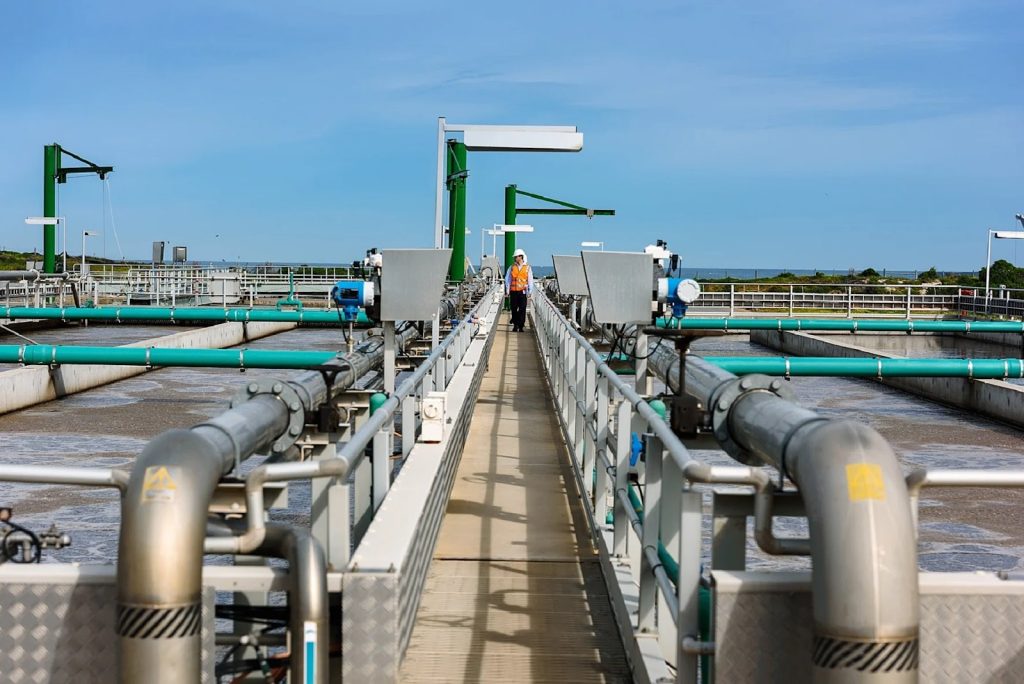

Treatment options for Blackwater
Treating blackwater is essential to remove contaminants and pathogens before disposal or reuse. Standard treatment options include septic tanks, aerobic treatment units, and wastewater treatment plants. Septic tanks allow for the settling and anaerobic decomposition of solid waste, while aerobic treatment units introduce oxygen to promote the growth of beneficial bacteria that break down organic matter.
Wastewater treatment plants employ physical, chemical, and biological processes to remove pollutants and disinfect the water. The treatment method choice depends on factors such as the volume of blackwater, local regulations, and available resources.
Disposal methods and regulations
Local regulations regulate how blackwater is disposed of after treatment to protect public health and the environment. In many cases, treated blackwater is discharged into designated leach fields or drainage systems, which can slowly percolate into the soil and undergo further natural filtration.
In some regions, treated blackwater may be released into surface water bodies, such as rivers or wetlands, but only if it meets strict water quality standards to prevent harm to aquatic ecosystems. Adhering to local regulations and obtaining necessary permits for blackwater disposal is essential to avoid legal consequences and environmental damage.
Importance of professional services for blackwater management
Managing blackwater requires specialised knowledge, equipment, and expertise to ensure compliance with regulations and protect public health and the environment. Engaging professional services for blackwater management can provide numerous benefits. These professionals have the experience and tools to design, install, and maintain appropriate containment and treatment systems tailored to your needs.
They can also provide regular inspections, maintenance, and repairs to ensure the proper functioning of your blackwater management system. By relying on professional services, you can have peace of mind knowing that your blackwater is being handled safely and efficiently, minimising the risk of environmental contamination and legal liabilities.
Managing Greywater
Greywater recycling and reuse options
Being less contaminated than blackwater, Greywater offers various recycling and reuse options. With proper treatment, greywater can be used for irrigation, toilet flushing, and outdoor cleaning. Recycling greywater reduces the demand for freshwater and helps conserve water resources. Greywater can be diverted from sinks, showers, and washing machines to a treatment system and then stored for later use. Some typical greywater reuse applications include landscaping, gardening, and car washing.
Treatment methods for greywater
Treatment methods for greywater vary depending on the intended use and local regulations. Simple treatment methods include physical filtration to remove solid particles and disinfection using chlorine or UV light to kill pathogens. More advanced treatment systems may involve biological processes, such as constructed wetlands or aerobic treatment units, which use microorganisms to break down organic matter and nutrients. The treated greywater should meet the required water quality standards for its intended use to ensure safety and prevent environmental damage.
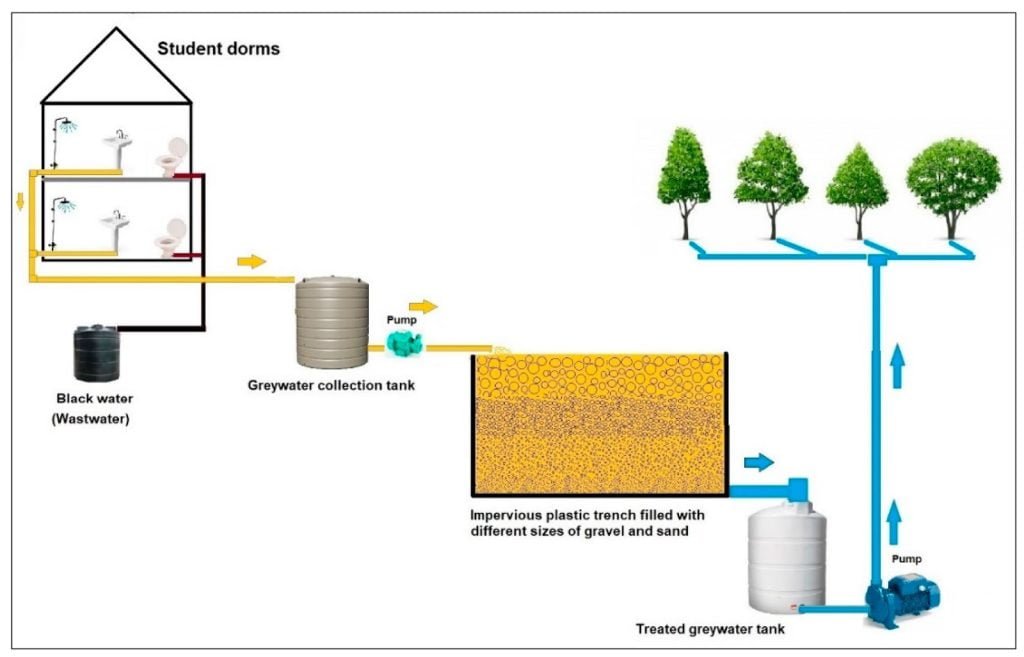

Precautions and guidelines for greywater use
When using greywater, it is essential to follow precautions and guidelines to minimise health risks and environmental impacts. Greywater should not be stored for extended periods to prevent the growth of harmful bacteria. It should be applied directly to the soil and not sprayed or allowed to pool on the surface to avoid human contact.
Greywater should not be used for drinking, cooking, or bathing, nor to irrigate edible crops that are consumed raw. Nor are regular maintenance and monitoring of the greywater treatment system necessary to ensure proper functioning and prevent contamination. Adhering to local regulations and guidelines for greywater use is crucial to ensure public health and environmental safety.
Blackwater Events and Their Impact
Definition of blackwater events
Blackwater events occur when untreated or partially treated blackwater is released into the environment, often due to system failures, overflows, or natural disasters. These events can have severe consequences for public health and the environment.
Causes and consequences of blackwater events
Causes of blackwater events include septic tank or sewage system malfunctions, excessive rainfall or flooding, and improper maintenance or design of blackwater management systems. When blackwater enters water bodies or soil, it can contaminate drinking water sources, harm aquatic life, and pose serious health risks to humans who come into contact with it. Blackwater events can lead to the spread of waterborne diseases, fish kills, and long-term ecological damage.
Prevention and mitigation strategies
Preventing blackwater events requires proper design, installation, and maintenance of blackwater management systems. Regular inspections, repairs, and upgrades can help identify and address potential issues before they escalate. Implementing backup systems, such as emergency storage tanks or generators, can minimise the risk of overflows during power outages or equipment failures.
Developing and practising emergency response plans can help mitigate the impacts of blackwater events by ensuring swift and effective action to contain and clean up any spills. Educating the public about proper waste disposal and reporting signs of blackwater events can also contribute to prevention and early detection efforts.
Protecting Our Water, Protecting Our Future
Proper management and disposal of blackwater and greywater are essential to protecting public health, preserving water quality, and maintaining the integrity of our ecosystems. To ensure compliance with regulations and the safety of your community, it is highly recommended that you seek professional assistance in wastewater management.
All Kinds Wastewater offers expert solutions for all your blackwater and greywater needs. Contact us today by phone, email, or visit our website to learn how we can help you manage your wastewater responsibly and efficiently. We can work towards a cleaner, healthier environment for future generations.

